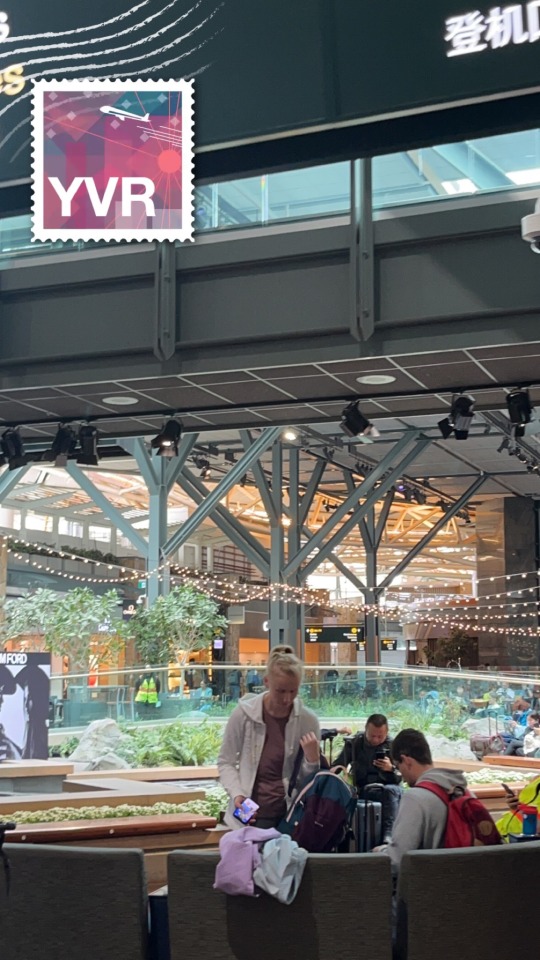#international travel Canada
Explore tagged Tumblr posts
Text
Canadian Passport Ranking 2025 With Full List Of Visa-Free Countries
Imagine holding a key that unlocks the doors to 188 countries without the hassle of visa applications or lengthy bureaucratic processes. In the 2025 Henley Passport Index, the Canadian passport has solidified its position as one of the most powerful travel documents in the world, securing the prestigious 7th spot globally and granting visa-free or visa-on-arrival access to an astonishing 188…
#Canada diplomatic ties#Canada passport benefits#Canada passport ranking#Canada vs US passport ranking#canadian passport#Canadian passport 2025#canadian passport ranking#Canadian travel freedom#e-visa countries Canada#full list visa-free countries Canada 2025"#global citizenship Canada#global opportunities Canada#Henley Passport Index 2025#international travel Canada#passport ranking#passport ranking 2025#seamless travel Canadian passport#top passports 2025#travel privileges Canada#visa-free countries Canada#visa-on-arrival countries Canada#why Canadian passport is powerful
0 notes
Text
Tariff and annexation threats by U.S. President Donald Trump combined with a weak Canadian dollar have Canadians crossing the United States off their list of travel destinations. Flight Centre Canada spokesperson Amra Durakovic said interest in U.S. travel began to wane in November. That trend saw explosive growth in February, with leisure travel bookings to the U.S. plunging 40 per cent year over year. “A lot of that has to do with the U.S. administration’s tariffs that were announced at the beginning of February, but also Prime Minister Trudeau encouraging Canadians not to travel to the U.S.,” Durakovic said.
Continue reading
Tagging: @newsfromstolenland
#tariffs#trump tariffs#international#usa#international travel#leisure travel#cdnpoli#canada#canadian politics#canadian news#canadian
142 notes
·
View notes
Text
A Canadian airline canceled flights to a Tennessee city amid Donald Trump's escalating trade war. Flair Airlines, a budget airline based in Edmonton, Alberta, revealed it is calling off all flights to Nashville.
#airlines#canada#tariffs#politics#political#us politics#news#donald trump#president trump#american politics#elon musk#jd vance#law#america#us news#maga#president donald trump#elon#republicans#make america great again#trump administration#republican#democrats#flying#travel#international trade#international travel#canadians#canadian#american
35 notes
·
View notes
Text










Zurich Airport, Switzerland (No. 1)
Zurich Airport (IATA: ZRH, ICAO: LSZH) is the largest international airport of Switzerland and the principal hub of Swiss International Air Lines. It serves Zurich, the largest city in Switzerland, and, with its surface transport links, much of the rest of the country. The airport is located 13 kilometres (8 mi) north of central Zurich, in the municipalities of Kloten, Rümlang, Oberglatt, Winkel, and Opfikon, all of which are within the canton of Zurich.
The airport is owned by Flughafen Zürich AG, a company quoted on the SIX Swiss Exchange. Major shareholders include the canton of Zürich, with 33.33% plus one of the shares, and the city of Zürich, with 5% of the shares. No other shareholder has a holding exceeding 3%. Flughafen Zürich AG used the brand name Unique from 2000 until 2010.
The company has stakes in various other airports around the world.
Source: Wikipedia
#N675UA - Boeing 767-322(ER) - United Airlines#ZRH#Zurich Airport#Flughafen Zürich#Kloten#Schweiz#Switzerland#travel#original photography#vacation#tourist attraction#landmark#cityscape#architecture#landscape#engineering#plane#Swiss International Air Lines#take off#Terminal E#runway#Air Canada
24 notes
·
View notes
Text

Happy New Year! I have some BIG goals for 2025 and I can't wait to get started! :-)
Photo: Banff, Alberta, Canada
#banff#moraine lake#banff national park#alberta#canadian rockies#canada#rocky mountains#mountain lake#mountains#canoes#nature#god's creation#the great outdoors#hiking#travel#tourism#adventure#explore#happy new year#o canada#nature's beauty#lake#western canada#north america#see the world#international travel#vacation
24 notes
·
View notes
Text
Greatness is a gift from all mighty Allah
#dubai real estate#uk news#canada news#australia travel#us politics#classic car#cars#fazza#fazza3#hamad international airport#germany iptv#germany news#europe#turkiye#turkey tail#turkey day#turkey bacon
22 notes
·
View notes
Text
Could Canada Join the EU? Unpacking a Curious Idea
Picture this: You’re at a cozy café, sipping your coffee, and your friend poses a question that sounds almost whimsical—“Could Canada join the EU?” The thought hangs in the air for a moment, both absurd and intriguing. Let’s dive into this curious concept together. The Case for Canadian Membership: More Than Just Geography When we think of the European Union (EU), we often visualize a…
#art#books#Canada#EU membership#food#international relations#multi-speed EU#photography#social democracy#travel
2 notes
·
View notes
Text

Montréal–Trudeau International Airport (YUL) in Dorval, Quebec, Canada.
#Airport#International airport#travel#flying#Montréal–Trudeau#Dorval#Quebec#Canada#Canadian Airports
9 notes
·
View notes
Text
youtube
my 1st vlog ever 📸✨🏆 how did you find it to be? comment below >>>
#mini vlog#vlog#travel#sports#hockey#match#live match#international tournament#new youtube videos#new vlog#new zealand#malaysia#japan travel#south korea#canada#pakistan#sport girls#announcer#vlogger#travel vlog#japan vlog#vlog squad#daily vlog#vlog blog#new video#youtube video#music video#video post#video#my video
3 notes
·
View notes
Text
Consult Mohali's immigration consultants for professional advice. Our consultants help with everything from immigration services to support for visa applications, offering specific guidance to ensure a smooth and easy process. Call (91-95177 79002) now. #StudyVisa #Mohali #ImmigrationAdvisers
#student visa#immigration#canada#study abroad#immigrate to canada#education consultant#study in australia#international education#uk travel#australia
4 notes
·
View notes
Text





Seattle->Vancouver
Oh boy has it been a LOOONG day(s). Gonna do updates in parts so this is the beginning of my travels. Woke up bright and early to head to the airport for a whole one (1) hour flight to Vancouver! Though it was short, it’s still out of the country—that’s a first for me! I like to look at the safety manual on airlines to see the different babies they draw, because sometimes they turn out really silly… Seattle’s was a bit disappointing to be frank. Once we got to the Vancouver airport we had five hours to kill before our next flight, so I walked around and enjoyed the beauty that is: Vancouver International Airport!! Hung around, took up only three seats trying to nap and had A&W! I thought that was just a root beer brand, not an actual restaurant?! You learn something new every day! Anywho, from then on we had our next flight which means, our next adventure B)
4 notes
·
View notes
Text
What was the Dominion's power in Star Trek?
In Star Trek, the Dominion is a powerful and dominant interstellar empire in the Gamma Quadrant. The Dominion’s power is primarily based on its advanced military and political organization, as well as the use of genetically-engineered soldiers called the Jem’Hadar and their fearsome warships like the Jem’Hadar battleships and the massive Cardassian-built warship known as the Dominion…

View On WordPress
#international world india AntipoloCity travel game fashionblogger dream worldwide gameday attraction movies movie captain tv#usa canada usa europe australia#dailyprompt
2 notes
·
View notes
Note
If u could live or travel anywhere in the world, where would u go?
If I could travel or live anywhere in the world, I’d choose some of the places I found through astrocartography. It’s an astrological science within itself, but the places I aligned with are places that I’ve always wanted to visit since I was a kid.
I’d LOVEEE to travel to Paris, London, Stockholm, Tokyo, Seoul, Cairo, Johannesburg, and Puerto Rico to name a few places.
My plans in the future are to move to Canada and get dual citizenship. Canada has a very mellow, somewhat dreary melancholic vibe that feels like an autumn day. But the people there are interesting, nice, and attractive haha. I can picture myself retiring in my 50s and living the rest of my life in a small cottage-like house with all my animal companions and my partner. That’s the dream ✨
5 notes
·
View notes
Text

#international travel#canada#canadians#us tourism#tourism#america#politics#political#us politics#news#donald trump#president trump#american politics#elon musk#jd vance#tariffs#us#us news#flights#aviation#law
8 notes
·
View notes
Text




























International Day of The World's Indigenous People
The International Day of the World’s Indigenous People on August 9 pays tribute to the indigenous communities of the world. The latest data reveals that there are about 370 to 500 million indigenous people living in 90 countries. These communities are noted to have their own unique set of languages, traditions, cultures, and governing systems. For many indigenous groups, the systems that their ancestors have followed for centuries have stood the test of time by serving them with positive outcomes to date. Many indigenous people’s special bond and connection with nature have also led to the protection of the general environment. However, on the other side, several indigenous communities face difficulties due to a central government’s covert and overt attempts to control their lives. This has led to indigenous people’s rights violations where they would have otherwise ensured peaceful and harmonious lives for them.
History of International Day of The World's Indigenous People
The first International Day of the World’s Indigenous People was officially celebrated in August 1995. The day had been brought into existence when the 49/214 resolution was passed by the U.N. General Assembly on December 23, 1994. August 9 was chosen as the commemorative date because that was when the first meeting of the U.N. Working Group on Indigenous Populations of the Sub-Commission on the Promotion and Protection of Human Rights was held. Every year, the day is honored by governments and organizations holding education forums and conferences to meet and discuss the social issues faced by indigenous groups worldwide. People are also given information on any ongoing and/or upcoming activities and projects that are being undertaken to help the target communities. Every year, the theme changes to shed light on a pressing topic, and the theme for the year 2021 was ‘Leaving no one behind: Indigenous peoples and the call for a new social contract.’
The social contract theme is a call for accountability in the general populations’ interaction with the indigenous communities and their resources. Over the years, many indigenous groups have found themselves to be on a disadvantageous terrain in the face of urban development projects that have destroyed and denigrated their lands and territories. The central governments and builders involved in such projects never sought permission from or even spoke with the indigenous communities before they took the developmental steps. Organizations and agencies like the U.N. and UNESCO have made efforts for constitutional/legislative reforms for dominant indigenous groups. Yet, the efforts must be focussed on bringing everyone together in the cause, leaving none behind.
International Day of The World's Indigenous People timeline
1982 First U.N. Meeting on Indigenous People
The U.N. holds the first meeting on indigenous people by forming the U.N. Working Group on Indigenous Populations of the Sub-Commission on the Promotion and Protection of Human Rights.
1995 International Day of the World’s Indigenous People
The first International Day of the World’s Indigenous People is celebrated by the U.N. General Assembly.
2005 - 2015 Indigenous People’s Decade
The U.N. proclaims 2005 to 2015 to be the ‘Decade of Action and Dignity’ for the indigenous communities.
2019 Indigenous Languages Year
After a startling 2016 report on the danger of more than 2,000 indigenous becoming extinct, the U.N. declares 2019 to be the International Year of Indigenous Languages in order to create awareness.
How To Observe International Day of the World’s Indigenous People
Learn about indigenous groups
Learn an indigenous language
Stand by indigenous groups
History related to indigenous people is always interesting to read and learn about. They have their own sets of beliefs, customs, languages, and cultures. Their daily lifestyles are also often connected with nature, be it animals, trees, certain plants, or lakes/rivers.
The U.N. declared the years 2022 to 2032 the decade for indigenous languages. The goal is to bring to attention the dying languages, since most of them are not taught in schools or are used by the general public. Losing a language is losing an important facet of the history and culture of a people.
The best way to celebrate this day and the rest of the year is by vowing to stand by indigenous groups. The indigenous people have the right to freely choose however they wish to live, much like any other living being on this planet. Protecting their rights also in turn protects your rights in the long run.
5 Interesting Facts About Indigenous People
80% of the world’s biodiversity
4,000 indigenous languages
High poverty rates
Short life spans
Leaders in protecting the environment
Around 80% of the world’s biodiversity is in places where indigenous groups are living.
The 5,000 indigenous communities in the world are credited with having about 4,000 languages.
While the indigenous communities account for only 5% of the world’s population, they make up 15% of the world population that is living in poverty.
Indigenous communities, due to a lack of awareness, have shorter life spans as they die of preventable diseases like malaria and H.I.V.
Studies have shown that the fauna and flora, and biodiversity thrive and flourish where indigenous people reside.
Why International Day of the World’s Indigenous People is Important
It’s a celebration of indigenous people
It’s a celebration of indigenous languages
It’s a celebration of the freedom to live
Indigenous people form an essential and crucial part of not only our planet’s history, but also how human beings have come to make systems to lead fruitful lives. The indigenous people’s cultures, customs, and traditions are interesting to learn about for their uniqueness and for what they teach us about the universe and the bigger picture.
Language, at its core, builds the identity of a people. The involvement of the different phonetics, grammar rules, and formal/informal styles can tell one a lot about where a community has come from, and how their history has shaped them. The same is the case with indigenous languages. The problem lies in their endangerment, and this is why we must strive to preserve them.
The freedom to practice our rights on a piece of land that has shaped our communities for centuries should not be taken away from anyone. The freedom to practice our customs, traditions, and general lifestyles is another important aspect of living a worthwhile life. For these very reasons and many others, we should join indigenous people in their right to live and flourish however they like.
Source
#Thunderbird sculpture by Jody Broomfield#Gitwangak Battle Hill#Two Brothers Totem Pole by Jaalen and Gwaai Edenshaw#Building on the Past Looking to the Future by Ken Anderson#Whitehorse#Yukon#Alberta#British Columbia#Canada#Vancouver#Terrace#Jasper#original photography#tourist attraction#landscape#International Day of The World's Indigenous People#9 August#jingle dance#DayOfTheWorldsIndigenousPeople#travel#vacation#USA#pictographs#petroglyphs
17 notes
·
View notes
